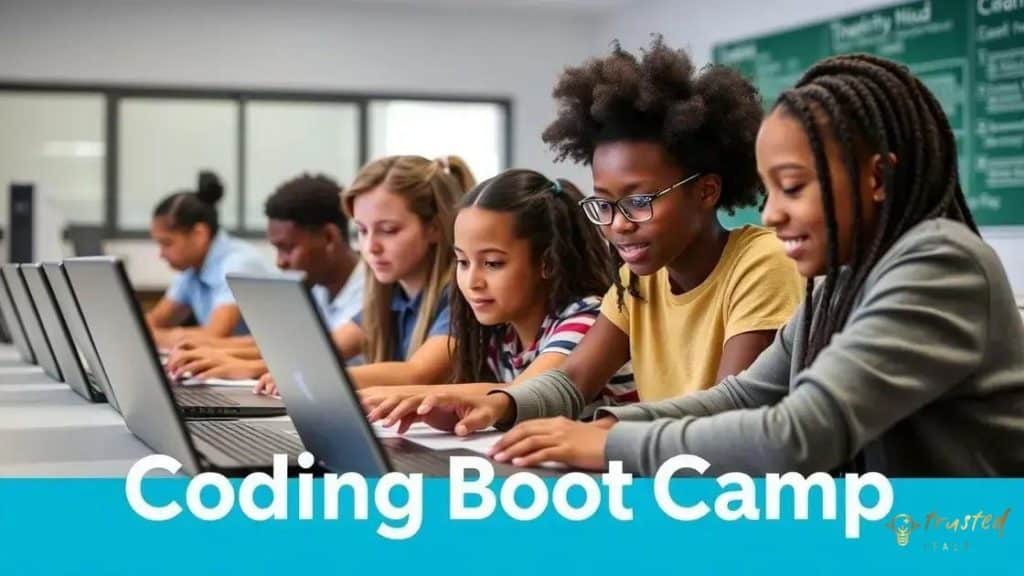The rise of coding boot camps and their role in workforce development

The rise of coding boot camps significantly enhances workforce development by offering focused, practical training that quickly equips individuals with in-demand tech skills, leading to higher employability and career advancement.
The rise of coding boot camps and their role in workforce development has transformed how individuals acquire tech skills. Have you thought about how these programs can impact career paths? Let’s dive into this evolving landscape.
What are coding boot camps?
Coding boot camps are intensive training programs designed to teach programming skills quickly. These camps offer a focused curriculum that usually lasts a few weeks to a few months, helping students transition into tech careers.
Many boot camps have emerged due to the increasing demand for skilled tech workers. They aim to provide practical knowledge and experience in programming languages like HTML, CSS, JavaScript, and Python. In this competitive job market, coding boot camps have become attractive for individuals looking to upskill or switch careers.
Key Features of Coding Boot Camps
Typically, coding boot camps feature:
- Hands-on learning experiences.
- Collaboration with peers on projects.
- Access to industry professionals.
- Job placement assistance for graduates.
Students not only learn coding but also how to work in teams, manage projects, and develop problem-solving skills. This blend of technical and soft skills is crucial in today’s workplaces.
Types of Coding Boot Camps
Boot camps come in various formats to suit different learning styles:
- Full-time camps, which require a significant time commitment.
- Part-time programs, ideal for those balancing work and study.
- Online courses that offer flexibility for remote learners.
- In-person training for hands-on experiences.
The flexibility in learning options has made coding boot camps accessible to a broader audience, allowing more people to enter the tech field.
With their practical approach, coding boot camps have proven effective at teaching real-world skills, helping students secure jobs in areas like software development, web design, and data analysis. By focusing on industry-relevant skills, these programs are filling the gap between traditional education and the fast-paced tech industry.
The evolution of workforce development

The evolution of workforce development has been marked by rapid changes in technology and the job market. Over the past few decades, the way we train and prepare individuals for work has shifted dramatically, adapting to the demands of a global economy.
Initially, workforce development focused primarily on traditional education and vocational training. Today, it has expanded to include various methods, such as online learning, internships, and coding boot camps. This change reflects the need for workers to acquire not just theoretical knowledge but also practical skills applicable in real-world situations.
Changes in Training Methods
As industries evolve, so do the ways we train employees. Some of the key changes in training methods include:
- Increased use of technology in education.
- Emphasis on hands-on experiences and practical skills.
- Integration of soft skills training alongside technical education.
- Accessibility of online and flexible learning options.
These changes allow individuals to learn at their own pace and adapt quickly to new technologies. Furthermore, organizations are increasingly partnering with educational institutions to create tailored training programs that meet specific industry needs.
Shift in Workforce Needs
The demand for workers with technical skills has surged as industries continue to integrate technology. Programs focused on coding and digital literacy have become crucial. Many companies now prioritize candidates with experience in programming, data analysis, and digital marketing. As a result, workforce development has shifted to emphasize these skills.
Coding boot camps are a perfect example of this shift, providing targeted education to meet the evolving needs of the job market. These programs allow individuals to gain essential skills quickly, making them more employable in the tech sector.
Additionally, there has been a growing recognition of the importance of lifelong learning. Workers are encouraged to continually update their skills to stay relevant in a constantly changing job landscape. This focus on ongoing education helps ensure a skilled workforce ready to meet future challenges.
Key benefits of attending a coding boot camp
Attending a coding boot camp offers numerous advantages for those looking to step into the tech industry. These programs are designed to deliver concentrated, practical training in a short period. As a result, participants can gain valuable skills and knowledge efficiently.
One of the main benefits is the strong focus on job-ready skills. Students learn programming languages, frameworks, and tools that employers are currently seeking. By enrolling in a boot camp, individuals can quickly equip themselves with the essentials for tech roles.
Accelerated Learning Experience
Coding boot camps provide an accelerated learning environment. Some of the key aspects include:
- Intensive, immersive curriculum.
- Hands-on projects that simulate real-world tasks.
- Fast-paced classes designed for quick mastery.
- Collaboration with peer learners.
The immersive environment helps individuals grasp complex topics faster than traditional education methods. Students work on projects that bolster their portfolios, showcasing their skills to potential employers.
Networking Opportunities
Another advantage of attending a boot camp is the networking opportunities it provides. Participants often connect with instructors who are industry professionals. These connections can lead to valuable mentorship and potential job referrals.
Boot camps often organize industry events or job fairs, allowing students to meet employers directly. Building a professional network early can be crucial in securing a desired position after graduation. This shared experience builds camaraderie among students, further enhancing their support system.
Moreover, many coding boot camps offer job assistance services. They help graduates prepare resumes, conduct mock interviews, and even connect them with hiring companies. This support significantly increases the chances of landing a job after completing the program.
Ultimately, the benefits of attending a coding boot camp go beyond the acquisition of technical skills. The combination of practical training, networking possibilities, and career support makes boot camps an excellent choice for aspiring tech professionals.
Success stories from boot camp graduates

Success stories from boot camp graduates highlight the transformative power of these programs. Many individuals have changed their lives and careers by attending coding boot camps. These stories serve as inspiration for those considering a similar path.
One common theme is the ability to shift careers quickly. For instance, many graduates enter boot camps with little or no coding experience. After completing their training, they often secure jobs as software developers, web designers, or data analysts. This rapid transition illustrates the effectiveness of the boot camp model, which focuses on providing the skills needed in today’s job market.
Real-Life Examples
Consider the story of Maria, who was previously working in retail. After attending a coding boot camp, she gained proficiency in JavaScript and Python. With her new skills, Maria secured an entry-level developer role within three months. Her experience reveals how intensive training can lead to successful job placement.
Another example is Jake, who came from a background in graphic design. He wanted to add coding to his skill set to enhance his employability. After completing a boot camp focusing on full-stack development, Jake not only learned to code but also built a portfolio of projects. This portfolio helped him land a job in a tech company as a UI/UX developer.
The Impact on Career Development
Many graduates report significant salary increases after completing boot camps. The demand for tech talent often means that those with the right skills can command higher wages. Graduates frequently share how boot camps have not only changed their professional paths but also improved their confidence and job satisfaction.
Networking opportunities during and after the boot camp have played a crucial role in their success. Many programs encourage collaboration and connections, creating a community of support that lasts beyond the classroom.
These success stories from boot camp graduates showcase the potential for change and growth within a short time frame. They inspire others to consider this effective route towards a rewarding career in technology.
Future trends in coding education
Future trends in coding education are evolving rapidly as technology becomes more integrated into our lives. As the demand for skilled programmers continues to grow, educational programs are adapting to meet these changes. This shift is crucial for preparing students for the jobs of tomorrow.
One significant trend is the increasing popularity of online learning platforms. With the rise of digital resources, coding education is more accessible than ever. Students can learn at their own pace, often at a lower cost than traditional education. This flexibility allows learners to balance their studies with work or other commitments.
Personalized Learning Experiences
Another trend is the move toward personalized learning experiences. Many coding boot camps and online courses are beginning to use adaptive learning technologies. This means that the curriculum adjusts according to each student’s progress and learning style.
- Tailored assessments help identify strengths and weaknesses.
- Customized paths allow students to focus on areas of interest.
- Real-time feedback enhances the learning process.
Such personalization helps foster a deeper understanding of programming concepts, making learning more effective.
Emphasis on Soft Skills
In addition to technical skills, coding education is beginning to emphasize soft skills. Employers are looking for candidates who can communicate well and work in teams. Coding boot camps are now incorporating training on:
- Effective communication with team members.
- Problem-solving and critical thinking.
- Time management skills for project completion.
This balance of hard and soft skills equips graduates for success in real-world environments.
As coding education continues to evolve, partnerships between educational institutions and tech companies are also on the rise. These collaborations ensure that curricula are aligned with industry needs. They help create a skilled workforce ready to tackle the challenges of future technologies.
Overall, the landscape of coding education is transforming to better serve students. With trends focusing on accessibility, personalization, soft skills, and industry alignment, the future looks bright for those entering the tech field.
FAQ – Frequently Asked Questions about Coding Boot Camps
What is a coding boot camp?
A coding boot camp is an intensive training program that teaches programming skills quickly, usually in a few weeks to months.
What skills can I learn at a coding boot camp?
Participants can learn various programming languages, frameworks, and tools needed for careers in tech, such as HTML, CSS, JavaScript, and Python.
How do coding boot camps help with job placement?
Many boot camps offer job placement assistance, including resume reviews, interview preparation, and networking opportunities with industry professionals.
Are coding boot camps suitable for beginners?
Yes, coding boot camps are designed for individuals at all skill levels, including beginners with no prior coding experience.